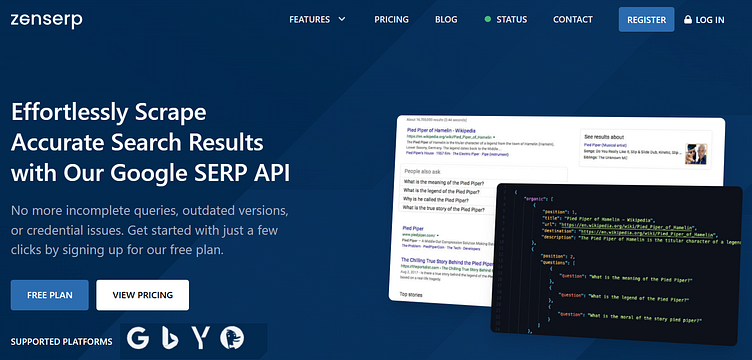Google Search API vs. Web Scraping with PHP
In the ever-expanding realm of information, extracting valuable data from the web has become a necessity for businesses, researchers, and developers. Google, as the ubiquitous search engine, is a treasure trove of information. Two popular approaches to tap into this wealth are using the Google Search API and web scraping with PHP. Let's explore the pros, cons, and nuances of these methods.
Google Search API: A Structured Approach
The Google Search API, a legitimate way to access search data, provides a structured interface for developers to retrieve search results programmatically. This official API offers a wealth of features, including customizable queries, language settings, and even customized search engines. It ensures you're adhering to Google's terms of use, avoiding any potential legal issues.
Advantages of Google Search API:
Structured Data: The API delivers structured JSON data, making it easy to parse and integrate into applications.
Real-Time Results: With the API, you can access real-time search results, ensuring your data is up-to-date.
Customizable Queries: Tailor your queries with parameters like location, time, and language for precise results.
Support and Reliability: As an official Google service, the API comes with reliable support and updates.
Web Scraping with PHP: Unleashing Versatility
Web scraping using PHP involves extracting information from web pages by parsing their HTML. While scraping can be powerful, it operates in a legal gray area. Developers should tread cautiously, respect website terms of use, and avoid overloading servers with requests. PHP libraries like "Goutte" and "simplehtmldom" facilitate scraping, enabling the extraction of specific elements like search result links, titles, and descriptions.
Advantages of Web Scraping:
Custom Extraction: Scraping allows you to extract specific data points tailored to your needs.
Versatility: Beyond Google, scraping can target any website for diverse data sources.
Real-Time Scanning: Like the API, scraping enables real-time data extraction, facilitating timely insights.
Cost Efficiency: Scraping is often free, whereas some API usage might incur costs.
Key Considerations:
Ethical Use: Both methods should prioritize ethical scraping practices, respect robots.txt files, and not overload servers.
Data Volume: Large-scale data extraction might lead to IP bans or CAPTCHA challenges.
Code Maintenance: Web structure changes may require frequent updates to scraping scripts.
Conclusion: The Choice Ahead
The choice between Google Search API and web scraping hinges on your use case, legal considerations, and technical expertise. The API offers structured, reliable access, while scraping offers versatility with additional cautionary steps. Ultimately, understanding your requirements and the ethical landscape is crucial.
As the digital landscape evolves, data will continue to shape decisions. By harnessing Google's vast repository, whether through its official API or cautious scraping, you unlock insights that power innovation, research, and informed decision-making.

